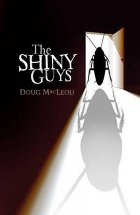The Shiny Guys by Doug MacLeod

Penguin, 2012. ISBN 9780143565307.
(Age: 15+) Highly recommended. Fifteen year old Colin Lapsley
is visited by the shiny guys, strange creatures that he can see out
of the corner of his eye. Colin is convinced that they want him to
pay for the terrible thing that he has done. His frantic parents
have him admitted to Ward 44 where he befriends Mango who has an
attachment disorder (he 'grabs people from behind and holds on') and
Anthea, who is anorexic.
The book begins: 'This story is set in 1985. Psychiatric wards are
different today.' MacLeod has written a tour de force about mental
illness, leavening it with his outstanding ability to write humorous
one liners. Colin is a wonderful character who uses jokes to cover
up his thoughts about the serious stuff that is happening around
him. At the same time he is a caring boy who looks after Mango and
ensures that Anthea, as a new patient, fits into the complex social
structure of Ward 44. As a reader I became engrossed in the lives of
these three patients, sympathising with them about their
relationships with their parents and revelling in their strengths
and generosity. MacLeod's device of having some chapters written in
Mango's almost illiterate hand, and question and answers from Anthea
and her doctor add to the reader's understanding of the three main
characters and give some relief from Colin's predicament.
MacLeod also builds up a strong thread of suspense that left me
wondering just what had happened to Colin's sister, Briony, who was
lost on a bushwalk, and how he was involved. Small hints are dropped
throughout the book and these kept me reading avidly. The reason for
Mango's attachment disorder is also a theme that is puzzling.
Most of all though, it is the serious theme of mental illness that
captured my interest. I found myself waking up in the middle of the
night thinking about ECT (Electroconvulsive therapy), and then
spending time looking at websites that discussed its medical
background and effectiveness.
Although at times this novel is very dark, MacLeod leaves the reader
with a ray of hope that a person with a mental illness can, with the
help of caring friends, and medical intervention, fight through
depression and better understand their feelings. Background to the
novel can be found on his blog.
Pat Pledger